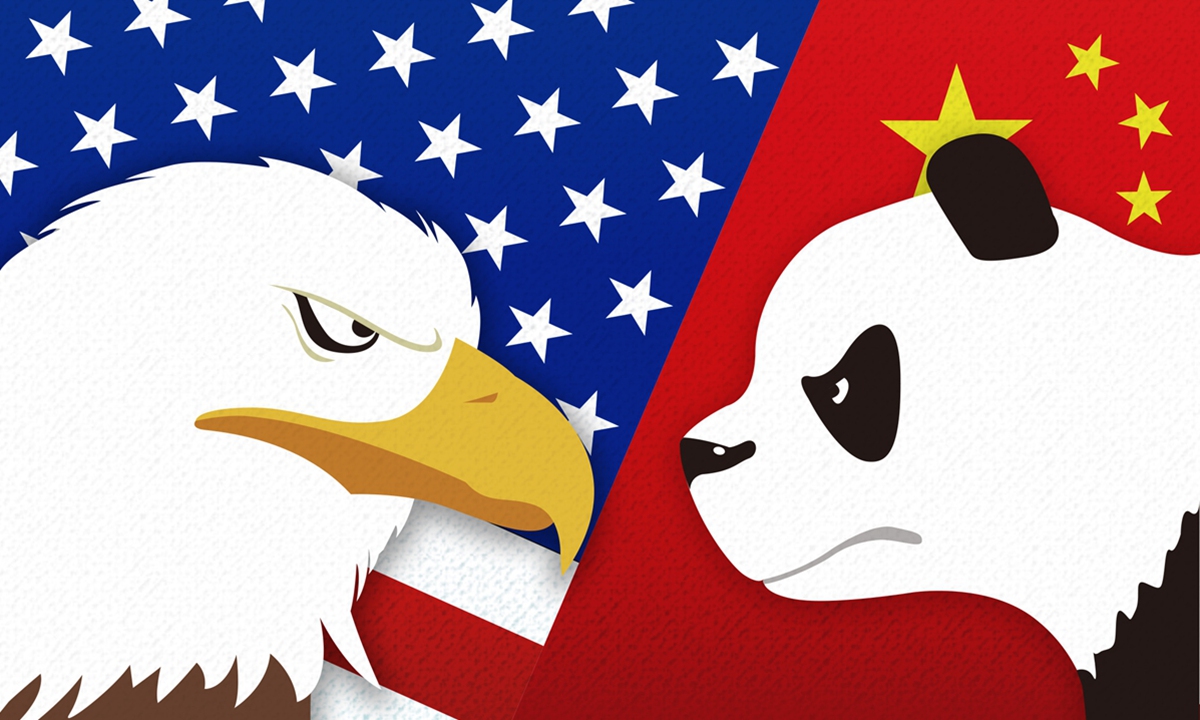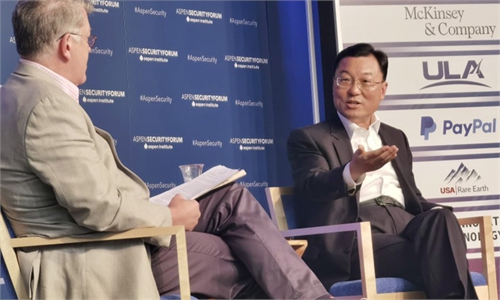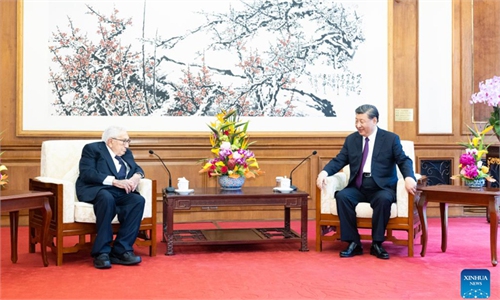Chinese President Xi Jinping meets with former US Secretary of State Henry Kissinger at the Diaoyutai State Guesthouse in Beijing, capital of China, July 20, 2023. Photo:Xinhua
While China gave its "old friend" Henry Kissinger 100-year-old former secretary of state and national security advisor a warm and grand reception in Beijing, a positive sign showing its sincerity to engage and stabilize relations, the White House said it "regrets" that the 100-year-old former secretary of state and national security advisor still had better access to Chinese officials than some incumbent US officials.
Although China has expressed expectations of mutual respect and meeting each other halfway to protect the "fragile thawing" in ties, US politicians have not stopped smearing and suppressing China, ranging from hyping "Chinese hackers" breaching email accounts of top US diplomats and investigations into US firms' investments in Chinese artificial intelligence (AI) and semiconductor companies to conniving Taiwan secessionist deputy regional leader's possible transit through the US.
Chinese experts said that the US incumbent officials have "sour grapes" mentality over Kissinger's visit to China, and is unable to treat it with an objective and rational attitude. Meanwhile, the US elites' China strategy is not based on the reality that the two sides enjoy a profound foundation of common interests and the general expectations of the international community, but blindly pursues an absolute advantage of strength, with a sense of so-called moral and cultural superiority.
Although analysts expect that under China's efforts, interactions between China and the US are expected to strengthen in the second half of 2023, and even face-to-face exchanges between two heads of state cannot be ruled out, if the US continues to blindly pursue confrontation in its China policy, the atmosphere and conditions for the meeting of the heads of state will disappear.
 China US Illustration: Liu Rui
China US Illustration: Liu Rui
'Sour grapes' reaction
In a meeting with Kissinger on Thursday in Beijing, Chinese President Xi Jinping hailed him as an "old friend" whom the Chinese people will never forget for his historic contributions to promoting China-US ties. Xi also expressed hope that Kissinger and other people of foresight in the US will continue to play a constructive role in restoring China-US ties to the right track.
China also prepared a banquet for Kissinger with cuisine and decorations filled with cultural significance. Dishes included a longevity peach cake, crane and pine ornamentation that traditionally symbolizes a long and healthy life for the elderly, as well as decorations of lush mountains and rivers, representing the enduring friendship and conveying hopes for peace and prosperity between China and the US.
In the US, State Department Spokesperson Matthew Miller said Kissinger went to China "under his own volition, not acting on behalf of the US government." White House National Security Council Spokesperson John Kirby said, "It's unfortunate that a private citizen can meet with the defense minister and have a communication and the US can't."
The Biden administration "looks forward to hearing from Secretary Kissinger when he returns, to hear what he heard, what he learned, what he saw," Kirby added.
Li Haidong, a professor at the China Foreign Affairs University, told the Global Times that the White House had "sour grapes" mentality over the high-level reception Kissinger received during his visit to China, but it had to acknowledge his role as an irreplaceable channel for communication at a time of bilateral tensions.
There is a real need for bilateral cooperation in areas such as economy and trade, climate change and combating drugs, Li said, "Rational policymakers and observers should be happy to see the lines of communication open and smooth."
The White House's emphasis of Kissinger's civilian identity shows its abnormal polarization in domestic politics, said Shen Yi, a professor at Fudan University, "They are worried that the Republicans will use this matter for a political attack as the 2024 election approaches."
"The current situation in China-US relations cannot be solved by Henry Kissinger alone. Kissinger's China tour reflects China's positive attitude and sincerity in maintaining China-US relations. This kind of sincerity is not because it fears the US, nor to gain leverage over the US," Shen said, "It's different from some American politicians' confrontational mindset."
The US government should learn from Kissinger's diplomatic acumen, and also exert sufficient political control at home, Diao Daming, an associate professor at the Renmin University of China in Beijing, told the Global Times on Friday.
Confrontation or communication
As for Kirby's veiled displeasure with the inability to hold a China-US defense chiefs meeting in his comments on Kissinger's meeting with Chinese Defense Minister Li Shangfu, experts said this is completely caused by Washington's unilaterally wrong and extreme approach toward China, as Li is still under US sanctions.
It is completely hegemonic logic if the US believes that China-US military dialogue can be carried out under such conditions… If the US does not reflect on itself, it won't be conducive to mending bilateral ties, Diao said.
In addition, the US has never stopped undermining bilateral relations.
Citing unnamed sources, the Wall Street Journal smeared China amid Kissinger's China tour, saying that "China-linked hackers" breached the email account of US Ambassador to China Nicholas Burns, as well as the email account of Daniel Kritenbrink, the assistant Secretary of State for East Asia.
Interestingly, Kritenbrink said at a Thursday hearing on China policy, "We are committed to managing this competition responsibly and to maintaining open lines of communication," without mentioning the "China-linked hackers."
Analysts said Kissinger's ideas can still shed light on the current muddled US policy toward China, as he believes that managing international relations requires common ground while reserving differences.
"It would be disastrous if Washington's policymakers' brains are full of ideology and value superiority," Li said.
Earlier on Wednesday, a US House committee launched an investigation into investments by four US venture capital firms into Chinese artificial intelligence and semiconductor companies, according to a Reuters report.
The common interests accumulated between China and the US over the past century are too large to be destroyed by some politicians' will. Therefore, the US' China policy should be based on objective reality, and Kissinger is a unique and living witness to the accumulation of common interests between China and the US over the past 50 years, Li said.
Kissinger, who has visited China more than 100 times, once again illustrated the importance of US-China exchanges at the age of 100.
The more frequent the exchanges between China and the US, the more it will help both sides, especially the US, stay rational and pragmatic in handling relations with China. If there is no communication, rumors will be used as weapons for some extreme US politicians who deliberately undermine China-US relations, Li said.
Chinese experts said that the interaction between China and the US may show a trend of strengthening in the second half of 2023 after Kissinger's visit, and there will likely be face-to-face exchanges between the two heads of state on occasions such as the G20 and APEC summits. However, if the US continues to pursue confrontation and provocation in its China policy, the atmosphere for the meeting of the heads of state will disappear.
For example, attention should be paid to the US' move on the Taiwan question, China's core interest and red line.
Regarding a possible transit visit of Taiwan secessionist Lai Ching-te through the US, Xie Feng, the Chinese Ambassador to the US, said at the Aspen Security Forum on Wednesday, "The Taiwan question is the most important and sensitive matter in China-US relations."
The pressing issue at hand is to resolutely block Lai's transit through the US, which is akin to a "grey rhino" charging toward us, Xie said.





